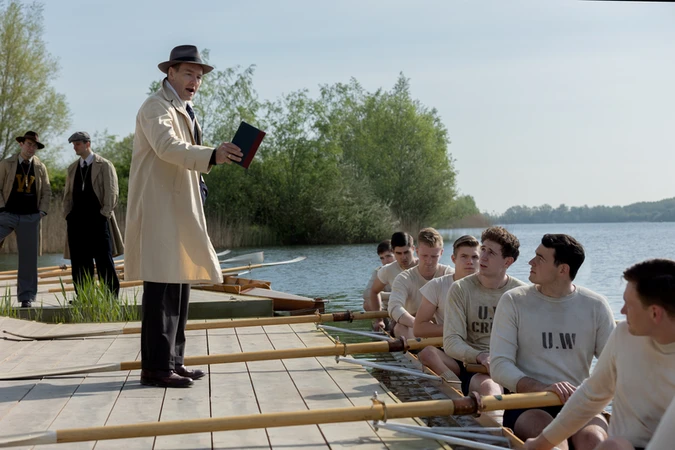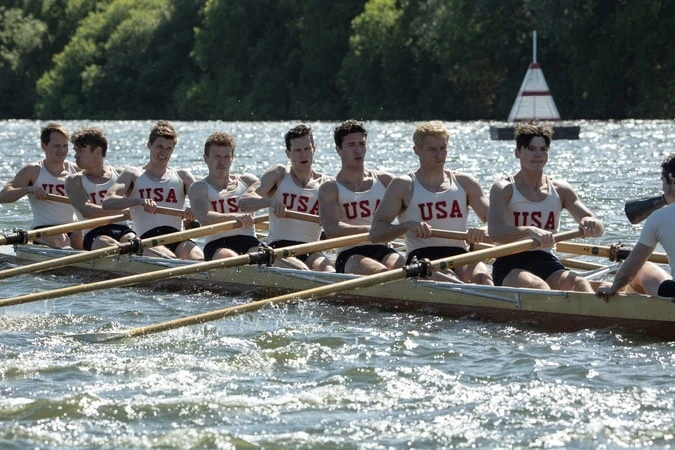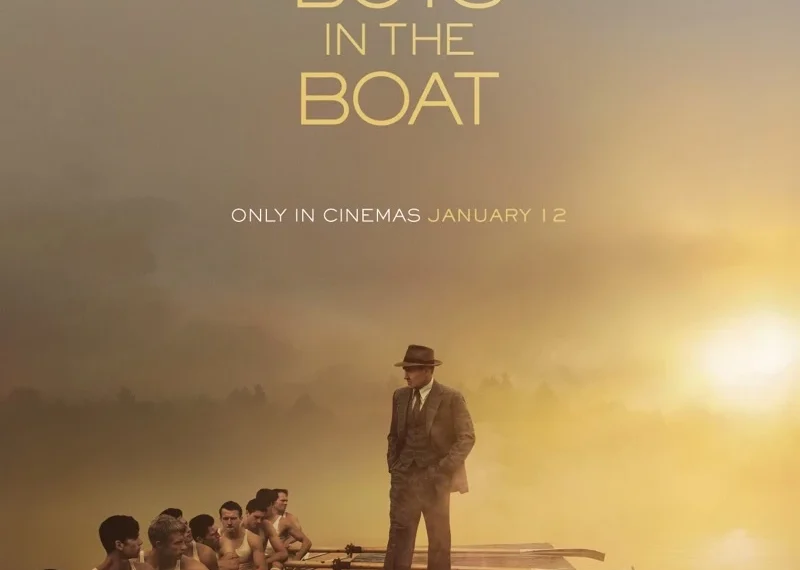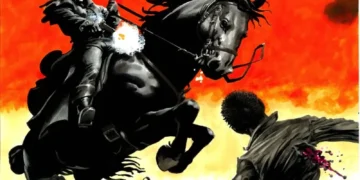Featuring: Joel Edgerton, Callum Turner
Genre: Biography, Drama, Sport
Director: George Clooney
In Cinemas: Now
1930s-set story centred on the University of Washington’s rowing team, from their Depression-era beginnings to winning gold at the 1936 Berlin Olympics.
The film focuses on Joe Rantz (Callum Turner), a working-class young man whose parents have abandoned him. He develops a desire to be in an eight-man rowing team in Seattle To earn money and survive his already poor life; there are moments where we see him sleeping in his car and trying to cover up the hole in his shoe. We slowly discover his passion for the sport, even when that wasn’t his initial attention when he started. George Clooney relies on old-fashioned aspirations with his latest offering, featuring some beats familiar to other movies and his previous work. Early in the film, during the team selection montage, we get introduced to Joel Edgerton’s character, Coach Al Ulbrickson, who is perceived as a straight talker and a matter-of-fact person when selecting his team. Joe (Turner) has to quickly adapt and balance his life at university while also being in a relationship with Joyce (Hadley Robinson). The disadvantaged Rowing team compete in a Regatta against the privileged kids, and to everybody’s surprise, they are victorious in beating them. In doing so, they get selected to compete in Berlin for the Olympics. However, there was no funding to send them to Germany because people thought they would not be hopeful of qualifying. Efforts start within the community to raise money to try and get the team over to compete in the Olympics.

George Clooney has not directed a period drama underdog sports movie since 2008, with Letherheads starting himself and Renée Zellweger almost 15 years ago, and there is a sense here of that longing for him to return to that gene again. There is a feeling and intention by Clooney to deliver an element of inspiration with The Boys in the Boat, which is quite clever because no matter the type of film, we as an audience always connect to that feel-good storytelling that resonates with us. But Clooney fails to achieve this, excluding the odd crowd-pleasing moment when the team win the gold meAdal. The narrative seems clichéd and poorly developed when building up to the Hollywood ending of success and achievement. The plot never really has that spark when trying to engage with the story and characters; there are never any attempts to flesh out the back story of some of the prominent people. Instead, we are given bullet points for what we need to know. Unfortunately, this doesn’t allow us as an audience to develop any motive with likeable or relatable traits towards the cast. The structure and pacing seemed a little drawn out, and there were moments where concentration and appeal were lacking.

Some positive things about that film should be admired, including the score by the talented Alexandre Desplat. He can elevate some moments of emotion when required throughout the film. The Cinematography and Editing give it a certain warmth and texture that reminds you of Chariots of Fire (1981). Ultimately, the story must be the most vital and engaging component of any movie, and there are some head-scratching moments when watching that almost require an explanation. The entire film, up until the near end, focuses on Joe (Turner), and then unexpectedly, the plot shifts and decides to give more attention to Joe’s teammate, who gets the stomach flu. It is an unusual and off-putting direction to intensify the final boat race while depending on one character for their victory. Before that moment, in one of the final scenes, the audience is given a brief introduction to this person, and we know very little about him apart from his ability to play musical instruments; that poor and unenergetic attempt at suspense is noticeable. The Boys in the Boat has an intense and passionate idea when constructing a message about speaking out against Nazism. Still, it lacks commitment and vigour, and there never seems to be any liveliness and pride about the topic. Although the script does tackle the effectiveness of the depression on the main characters and how they were considered to show any glimpse of hope to younger people. Some scenes stand out, and Joel Edgerton gets his iconic sports coach speech like Al Pacino in Any Given Sunday (1999). But the overall tone of Clooney’s latest film feels flat and bare with a repetitiveness, which is disappointing as this remarkable true story deserves a better big-screen treatment.
Overall: 5.5/10


















